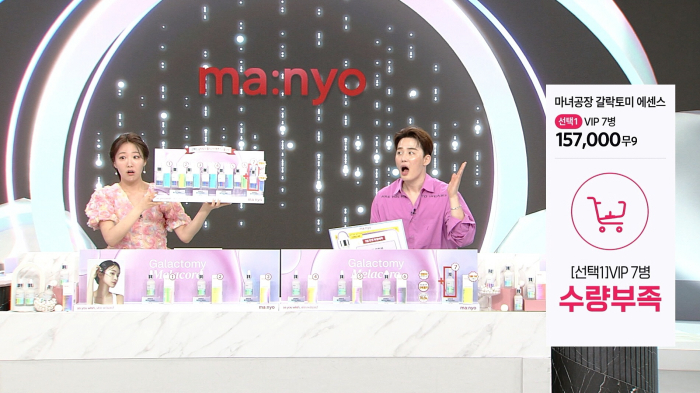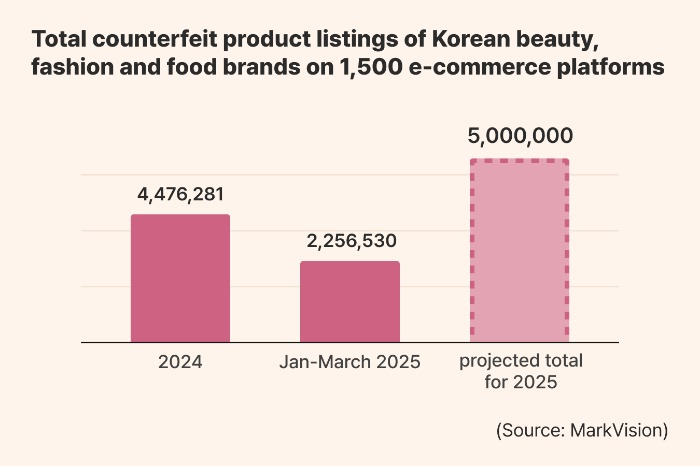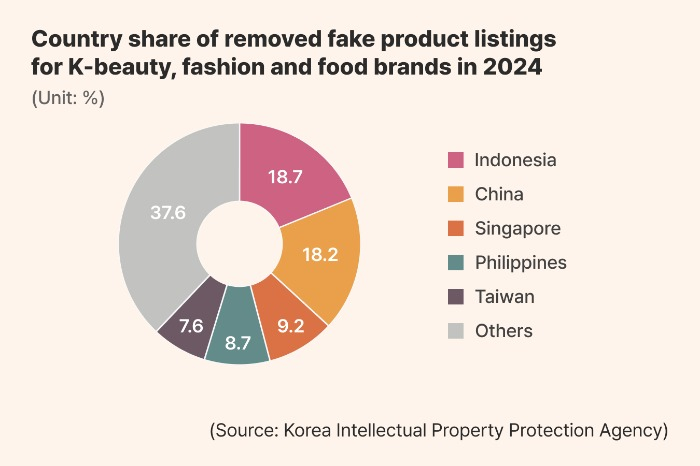
Counterfeit Korean beauty, fashion and food products are surging on major overseas e-commerce platforms, with lookalike packaging making them hard to distinguish from genuine items.
As Korean indie cosmetics and fashion labels win over consumers worldwide for quality and affordability, losses from counterfeit Korean consumer goods were estimated at 500 billion won ($362 million) in the first five months of this year, according to AI-based intelligent property piracy monitoring firm MarkVision.
During the period, more than 2.25 million counterfeit items imitating Korean fashion, beauty and food brands were detected on major overseas e-commerce platforms.
The figures are based on MarkVision’s monitoring of about 1,500 online shopping platforms operating in 180 countries, including Singapore-based Shopee, Alibaba.com, Lazada and JD.com, formerly Jingdong.
The surge follows last year’s record of 4.47 million cases. At the current pace, total counterfeit listings for Korean brands are projected to surpass 5 million by year-end.
In 2024, estimated losses from fake K-beauty and fashion brands rose to 1.5 trillion won, compared to 1.03 trillion won a year before, according to MarkVision.

TikTok videos offering tips to identify fake Korean cosmetics have gone viral in countries, including India, Saudi Arabian and the UK.
“This is a counterfeit Beauty of Joseon sunscreen purchased on Amazon,” said a TikTok user, referring to the Korean skincare brand. “The sealed plastic sticker design is identical to the original. Apart from slightly bolder lettering and a more plastic-like tube texture, it’s nearly impossible to tell the difference.”
Some fakes, including a Chinese knockoff of the popular Korean instant noodle brand “Bulldak,” have even copied barcodes to mimic the originals.
Manyo Factory Co., a Korean indie cosmetics brand and Depound, a moderately priced youth fashion brand, are among the Korean labels that have reported a sharp rise in counterfeit products.
TIP OF THE ICEBERG
A MarkVision official said the detected copycat listings represent only the tip of the iceberg, as offline stores and small-to-medium-sized online malls remain difficult to monitor.
“The number of clients using counterfeit detection services more than doubled from a year earlier,” he said. “Korean consumer goods companies might be losing several trillion won annually to their copycats.”
An increasing number of fake Korean skincare product users report skin irritation and other issues because they often differ in scent and texture.
However, counterfeit versions of popular K-beauty brands such as Anua, Beauty of Joseon, TirTir, Biodance and Medicube are being sold overseas at prices similar to the originals, or just 10% below.
K-FASHION
K-fashion labels such as Matin Kim has suffered the most from knockoffs this year, accounting for over 1.23 million cases, or more than half the total. Estimated damages from online counterfeit sales in the sector reached 389.6 billion won, representing 81.1% of the total losses tied to Korean counterfeit products.

CHINESE ONLINE STORES
In March, 7,581 out of 14,196 takedown requests filed by the Korea Intellectual Property Protection Agency (KOIPA) — about 53.4% — were directed at Shopee.
Chinese platforms came in next. Lazada accounted for 9.9%, followed by Taobao (5.5%), AliExpress (4.1%) and Alibaba.com (2.9%).
US e-commerce giants such as eBay and Amazon were also among the top 10 sources of counterfeit Korean product listings.
“We’re screening 1,650 e-commerce sites across 115 countries. It’s hard to find a country free from counterfeit products of Korean brands” said an official of the Korean Intellectual Property Office (KIPO).
In 2024, KOIPA filed 190,000 takedown requests with e-commerce platforms in 45 countries, marking an year-on-year increase of about 19%.
To curb the spread of knockoffs, Korean skincare companies are steering customers toward official sales channels.
“We’re stepping up marketing to encourage consumers to buy through authorized channels,” said an official of APR Co., known for its Medicube skincare brand.

Samyang Foods Co. recently completed its second plant in Milyang, South Gyeongsang Privince South Korea. It chose a domestic site over an overseas location as part of efforts to protect its intellectual property.
“Chinese fakes of Buldak Bokkeum Myeon are identitcal to the original in barcode and lettering size,” said Kim Dong-chan, chief executive of Samyang Foods. He added that the company is taking steps to protect the intellectual property of its flagship product, a spicy chicken-flavored ramen.
According to a report of the Illicit and the Korean economy published by the OECD in 2024, the total lost sales of Korean intellectual property rights holders due to trade in counterfeit goods amounted to more than $6.1 billion in 2021.
It resulted in the loss of more than 13,000 jobs and a $1.5 billion decline in Korean tax revenue.
By So-eui Lee and Jong-Seo Park
claire@hankyung.com
Yeonhee Kim edited this article.















